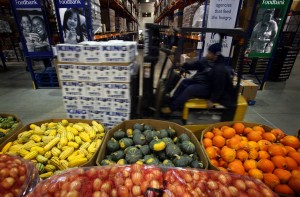 As part of its on-going work to promote policies that reduce food waste, the Food Law and Policy Clinic partnered this fall with Professor Nicole Civita, Director of the Food Recovery Project at University of Arkansas School of Law, to analyze federal bill H.R. 4719, the “America Gives More Act.” This bill, among other provisions, would allow all businesses to benefit from enhanced tax deductions for food donations. While currently only C-corporations (often the largest companies) receive this benefit, expanding the enhanced tax deduction would incentivize smaller businesses to donate food rather than letting it go to waste.
As part of its on-going work to promote policies that reduce food waste, the Food Law and Policy Clinic partnered this fall with Professor Nicole Civita, Director of the Food Recovery Project at University of Arkansas School of Law, to analyze federal bill H.R. 4719, the “America Gives More Act.” This bill, among other provisions, would allow all businesses to benefit from enhanced tax deductions for food donations. While currently only C-corporations (often the largest companies) receive this benefit, expanding the enhanced tax deduction would incentivize smaller businesses to donate food rather than letting it go to waste.
Based on their research, the team wrote a sign-on letter and collected signatures from 30 food recovery organizations and leaders from around the country to ask the members of the U.S. Senate Finance Committee and Senate Hunger Caucus to support H.R. 4719’s permanent tax provision.
Americans waste an astounding 160 billion pounds of food each year, in homes, fields, manufacturing plants, markets, schools, and restaurants. At the same time, almost 15 percent of U.S. households struggle with food insecurity. To encourage more food businesses to donate safe, wholesome food to organizations that serve those in need, the federal government should offer enhanced tax deductions for food donations not just to the largest corporations, but to farms, small businesses, independent restaurants, and other food businesses that have excess food.
Without the guarantee of a tax deduction, many businesses find it more cost-effective to simply throw out excess food rather than expend the time, money, and resources to store, transport, and distribute the food on a regular basis. Indeed, leading hunger-relief organizations, including Feeding America, confirm that uncertainty regarding the tax code prevents food sector businesses from developing regular donation programs with hunger-relief organizations.
By passing the food donation-related provisions of the America Gives More Act, the Senate can stand with socially-responsible food businesses of all types and sizes, food-insecure Americans, and the heroic charities and volunteers who fight hunger.


Health Law & Policy, Commentary
Braidwood Management v. Becerra: Updated FAQs for Health Advocates and Providers
July 22, 2024